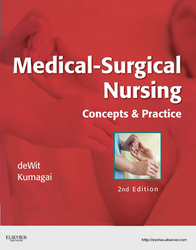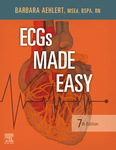「重要なお知らせ:日本語書籍をご購入いただき、eLibraryをご利用の皆さまへ」
エルゼビアは、より快適にサービスをご利用いただくため、システムの重要なアップ
デートを実施いたしました。
現在eLibraryで日本語電子書籍をご利用のお客様は、今後より高いアクセシビリティとセ
キュリティを備えた新しいプラットフォーム「eBooks+」へアカウントが移行されてい
ます。eBooks+のご利用については
こちらよりご利用・ご登録ください。
Book Description
The clear, concise, and cutting-edge medical-surgical nursing content in Medical-Surgical Nursing: Concepts & Practice, 2nd Edition provides the solid foundation you need to pass the NCLEX Examination and succeed as a new nurse. It builds on the fundamentals of nursing and covers roles, settings, health care trends, all body systems and their disorders, emergency and disaster management, and mental health nursing. Written by noted authors Susan deWit and Candice Kumagai, Medical-Surgical Nursing reflects current national LPN/LVN standards with its emphasis on safety as well as complementary and alternative therapies.
- UNIQUE! LPN Threads share learning features with Elsevier's other LPN textbooks, providing a consistency across the Elsevier LPN curriculum.
- Key Terms include phonetic pronunciations and text page references.
- Key Points are located at the end of chapters and summarize chapter highlights.
- Overview of Anatomy and Physiology at the beginning of each body system chapter provides basic information for understanding the body system and its disorders.
- Nursing Process provides a consistent framework for disorders chapters.
- Evidence-Based Practice is highlighted with special icons indicating current research.
- Assignment Considerations boxes address situations in which the charge nurse delegates to the LPN/LVN or the LPN/LVN assigns tasks to unlicensed assistive personnel.
- Focused Assessment boxes include information on history taking and psychosocial assessment, physical assessment, and guidance on how to collect data/information for specific disorders.
- Elder Care Points boxes address the unique medical-surgical care issues that affect older adults.
- Legal and Ethical Considerations boxes focus on specific disorder-related issues.
- Safety Alert boxes highlight specific dangers to patients related to medications and clinical care.
- Clinical Cues provide guidance and advice related to the application of nursing care.
- Think Critically About boxes encourage you to synthesize information and apply concepts beyond the scope of the chapter.
- Concept Maps in the disorders chapters help you visualize difficult material and illustrate how a disorder's multiple symptoms, treatments, and side effects relate to each other.
- Health Promotion boxes address wellness and disease prevention, including diet, infection control, and more.
- Complementary and Alternative Therapies boxes offer information on how nontraditional treatments for medical-surgical conditions may be used to complement traditional treatment.
- Cultural Considerations promote understanding and sensitivity to various ethnic groups.
- Nutrition Considerations address the need for holistic care and reflect the increased focus on nutrition in the NCLEX Examination.
- Patient Teaching boxes provide step-by-step instructions and guidelines for post-hospital care.
- Home Care Considerations boxes focus on post-discharge adaptations of medical-surgical nursing care to the home environment.
- Mental Health Nursing unit includes information on disorders of anxiety and mood, eating disorders, cognitive disorders, thought and personality disorders, and substance abuse.
- Disaster Management content includes material focusing on preparation and mitigation to avoid losses and reduce the risk of injury associated with both natural and bioterrorist disasters.


 (0 rating)
(0 rating) 






